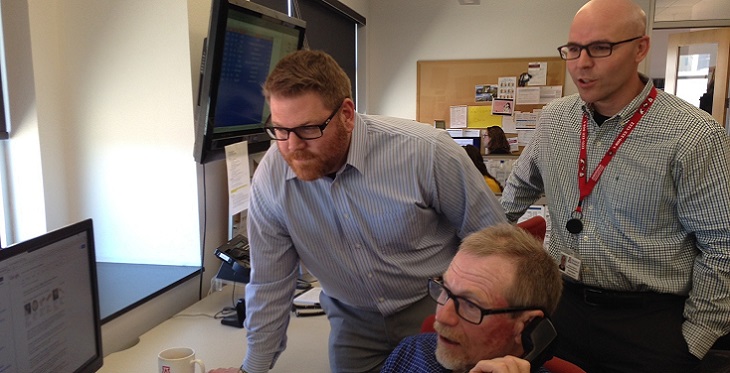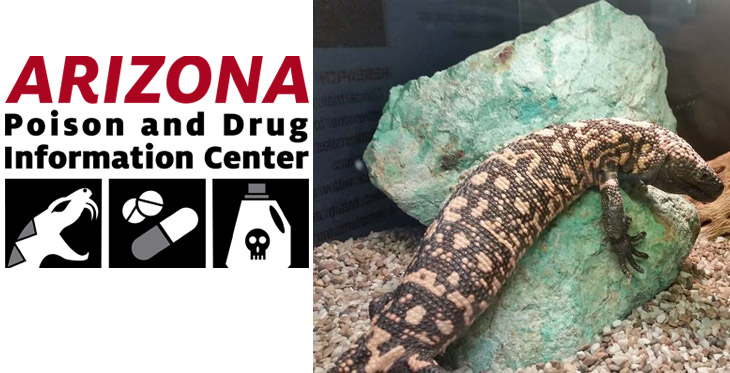A University of Arizona College of Pharmacy program is saving Arizonans millions of dollars a year in health-care costs.
It’s the pharmacy college’s Arizona Poison and Drug Information Center – a public service in operation since1955, when it became the second poison center in the country; the first was launched in Chicago, in 1953.
Staffed with pharmacists, physicians, genetic counselors and a public educator, the UA center is available to phone callers 24 hours a day, every day of the year.
And it’s free of charge.
Been stung by a scorpion? Want to know how much Tylenol your toddler can take? Wondering if a new medicine is causing that itchy rash?
You can call the Arizona Poison and Drug Information Center any time of day or night, and a licensed pharmacist or other expert will give you the information you need.
“It’s an incredible service. It’s why I love what I do,” says Keith Boesen, a UA-trained pharmacist and director of the Poison and Drug Information Center.
The UA center serves all of Arizona except for Maricopa County, which has its own poison center, in collaboration with Banner-University Medical Center in Phoenix.
For every dollar a poison center spends in operating costs, it saves $13 in healthcare costs, surveys have shown. The two Arizona centers report combined healthcare savings of more than $45 million a year, mostly by helping callers avoid emergency room visits.
The Arizona Poison and Drug Information Center has a staff of about 20 experts. Boesen started with the center in 2000, when he was a UA College of Pharmacy intern. He received his PharmD degree from the UA in 2002, and became center director in 2009.

The center serves a population of more than 2.5 million, as well as rural hospitals throughout most of the state. About 80 percent of the calls it receives come from the general public, while 20 percent come from physicians and other healthcare providers.
“When the phone rings, about half the time it’s about someone being exposed to something,” Boesen says. “For example, someone may call us and ask about a potential drug interaction, and we may be able to prevent the interaction, or the side effects.
“A lot of the questions are ‘What do I do if I get bitten by a rattlesnake or stung by a scorpion," Boesen says. “So a lot of these questions are about prevention.”
Rural hospitals have called the UA center to get advice about whether the hospital needs to have a patient transported to a larger hospital in Tucson.
“We can assure them, 'that patient should be fine, you don’t have to transport them', or we may say, ‘This is not a patient you should keep. You should prepare this patient for transport,’” Boesen says.
“Every call we field, regardless of who it’s from, is documented,” he says. “We report to the national data bank of our national organization, the American Association of Poison Control Centers, on average every eight minutes. This real-time reporting by poison centers around the nation is under constant surveillance by the American Association of Poison Control Centers, and the Centers for Disease Control and Prevention. This database is capable of detecting toxic concerns with new medications or products that come on the market, as well as food poisoning outbreaks and a possible terrorist attack, although they haven’t discovered an attack yet.”
The Arizona Poison and Drug Information Center averages about 100 calls per day. In addition to state funding, Arizona’s poison centers receive funds from their local health departments, and some non-profits.
So what is the busiest time of year for the UA Poison and Drug Information Center? If you guessed the winter holidays, you guessed wrong. It’s August and September, when the rattlesnakes and scorpions are out and about.
With all the advances being made in telemedicine, it may be difficult to think of a simple telephone call as an example. “It’s the original telemedicine,” Boesen says, adding that the first poison center in the country, in Chicago, has been answering phone calls since 1953.
To reach the UA College of Pharmacy’s Poison and Drug Information Center, call 1-800-222-1222.

